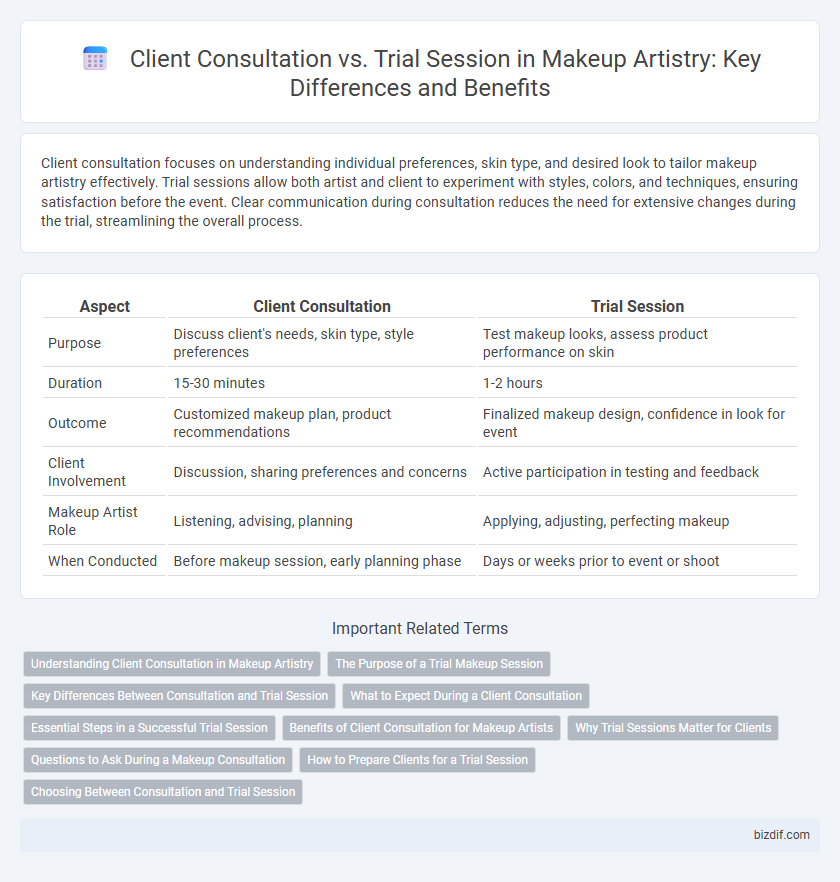Client consultation focuses on understanding individual preferences, skin type, and desired look to tailor makeup artistry effectively. Trial sessions allow both artist and client to experiment with styles, colors, and techniques, ensuring satisfaction before the event. Clear communication during consultation reduces the need for extensive changes during the trial, streamlining the overall process.
Table of Comparison
| Aspect | Client Consultation | Trial Session |
|---|---|---|
| Purpose | Discuss client's needs, skin type, style preferences | Test makeup looks, assess product performance on skin |
| Duration | 15-30 minutes | 1-2 hours |
| Outcome | Customized makeup plan, product recommendations | Finalized makeup design, confidence in look for event |
| Client Involvement | Discussion, sharing preferences and concerns | Active participation in testing and feedback |
| Makeup Artist Role | Listening, advising, planning | Applying, adjusting, perfecting makeup |
| When Conducted | Before makeup session, early planning phase | Days or weeks prior to event or shoot |
Understanding Client Consultation in Makeup Artistry
Effective client consultation in makeup artistry involves detailed discussions about skin type, face shape, personal style, and event specifics to tailor makeup application precisely. This process allows artists to identify allergies, preferred products, and desired looks, ensuring satisfaction and minimizing last-minute changes. Unlike trial sessions, consultations focus on gathering information and setting expectations before any application begins.
The Purpose of a Trial Makeup Session
A trial makeup session allows makeup artists and clients to experiment with different looks, ensuring the final makeup meets the client's preferences and skin type perfectly. It helps identify potential allergies or product issues, reducing the risk of adverse reactions on the event day. This session also facilitates adjustments based on lighting and attire, guaranteeing a flawless and long-lasting appearance.
Key Differences Between Consultation and Trial Session
Client consultation focuses on understanding the client's skin type, preferences, and event details to design a personalized makeup look, typically involving discussion without applying makeup. Trial sessions include a hands-on application of makeup to test and refine the design, allowing adjustments for colors, techniques, and products based on the client's feedback. Key differences lie in consultation being primarily a planning phase, while the trial session is practical, ensuring the final look meets the client's expectations on the actual event day.
What to Expect During a Client Consultation
During a client consultation, expect an in-depth discussion about your skin type, preferred style, and any allergies or sensitivities to makeup products. The makeup artist will assess your facial features, recommend suitable colors and techniques, and address specific event requirements to ensure a tailored look. This initial meeting focuses on creating a personalized makeup plan without applying products.
Essential Steps in a Successful Trial Session
A successful trial session in makeup artistry involves thorough client consultation to understand preferences, skin type, and event details, ensuring tailored makeup application. Evaluating product compatibility and testing various styles during the trial helps identify the best look while avoiding potential allergic reactions or discomfort. Documenting the finalized makeup plan with photos and notes guarantees consistency and client satisfaction on the event day.
Benefits of Client Consultation for Makeup Artists
Client consultation allows makeup artists to understand clients' skin type, preferences, and event specifics, enabling tailored makeup designs that enhance satisfaction. It facilitates open communication, setting clear expectations and preventing misunderstandings during the session. By addressing potential allergies or sensitivities early, consultations ensure safer product choices and optimal application results.
Why Trial Sessions Matter for Clients
Trial sessions provide clients with a hands-on opportunity to experience different makeup looks, textures, and finishes before the actual event, significantly reducing the risk of dissatisfaction. These sessions allow makeup artists to customize techniques and products based on the client's skin type, preferences, and concerns, ensuring a flawless and long-lasting result. Investing in a trial session enhances communication, builds trust, and guarantees that the final makeup aligns perfectly with the client's vision.
Questions to Ask During a Makeup Consultation
During a makeup consultation, key questions include skin type, allergy sensitivities, preferred makeup style, and specific areas of concern to ensure personalized product selection and application techniques. Discussing the client's event type and desired look helps tailor the makeup artistry to suit lighting and longevity needs. Clarifying budget and product preferences ensures alignment with client expectations before proceeding to a trial session for practical makeup testing.
How to Prepare Clients for a Trial Session
Preparing clients for a trial session involves gathering detailed information during the consultation about their skin type, makeup preferences, and event theme to tailor the look effectively. Providing a checklist that includes skincare routines, bringing inspiration photos, and discussing any allergies or sensitivities ensures the session runs smoothly. Clear communication about the trial session's purpose and setting realistic expectations helps clients feel confident and satisfied with the final makeup design.
Choosing Between Consultation and Trial Session
Choosing between a client consultation and a trial session depends on the event's complexity and client preferences. Consultations provide a detailed discussion about skin type, allergies, and desired looks to ensure personalized makeup application, while trial sessions offer a hands-on opportunity to test products and techniques for flawless results. Prioritizing a trial session is essential for weddings or special occasions requiring precision, whereas consultations suffice for simpler makeup needs or first-time clients.
Client consultation vs Trial session Infographic

 bizdif.com
bizdif.com